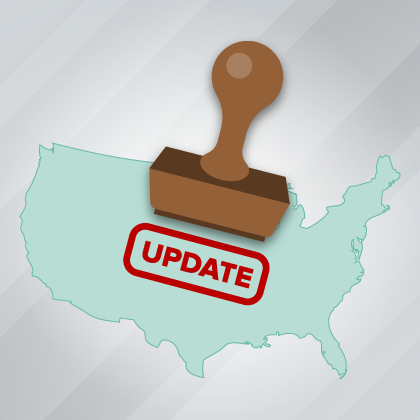Negotiated Rulemaking Committee Proposes Changes to Professional Licensure and Reciprocity

Proposed changes to regulations from the U.S. Department of Higher Education could significantly impact how The Ohio State University and other higher education institutions around the country handle both state authorization and professional licensure disclosures.
Changes to Professional Licensure Disclosures
In November 2019, the U.S. Department of Education agreed to increase student consumer protections by requiring institutions to disclose to prospective students whether educational programs that lead to professional licensure or certification meet educational requirements, do not meet requirements, or if no determination has been made as to whether the program meets educational requirements to obtain licensure or certification in each U.S. state. This regulation went into effect July 1, 2020.
A new round of negotiated rulemaking began in January 2022 to revise the current disclosures. If the regulations proposed by the negotiated rulemaking committee are finalized, the current regulation would be replaced with new language. Two proposals are currently under consideration: One, proposed in January 2022, would require institutions to either “ensure that all programs that require programmatic accreditation and/or licensure/certification meet those requirements” and eliminate public disclosures that were previously required in 34 CFR 668.43 (a)(5)(v); the other, drafted in February 2022, would keep the disclosures required in 34 CFR 668.43 (a)(5)(v) but eliminate the option for a “no determination made” disclosure.
Changes to Reciprocity
Additionally, the proposed updates revisit the definition of a state authorization reciprocity agreement. The updated language states that an institution must: “comply with all state consumer protection laws, including both generally-applicable state laws and those specific to educational institutions, except for state requirements for obtaining state authorization that are inapplicable pursuant to a state authorization reciprocity agreement.”
It is also important to note Congress is addressing the ability to disburse Pell Grants to students in short-term programs — with limitations, including that grant funds would not be offered for distance education courses.
What Would This Mean for Ohio State and for Students
Though it’s clear that the Department of Education’s intent is to increase student consumer protections, the new proposed language, as written, could cause unintended harm to students and place an undue burden on institutions.
First, “ensuring” curriculum meets educational requirements in a state sets a bar that is currently unreachable and would be legally binding. Not all states have a process in place to approve institutional curriculum, and among those that do, the approval process is not consistent across states. This will create a liability risk for institutions and a heavy burden on state licensing boards, as institutions would need assurance from each licensing board to document that its curriculum meets state educational requirements for professional licensure or certification.
Second, the proposed regulation would eliminate student choice for many, including military and out-of-state students as well as students who do not wish to pursue licensure or certification after obtaining their degree, since students who live in a state where the program does not meet state educational requirements for licensure or certification would no longer be able to enroll in these programs.
Finally, the current state authorization reciprocity agreement provides uniform requirements for state oversight of distance education. The new language proposed would allow states with varied requirements to enforce all state consumer protection laws, including those specific to educational institutions, thus negating or severely limiting reciprocity.
What Happens Next?
One more week of rulemaking will take place March 14-18, 2022. There is a public comment period for the last 30 minutes of each day.
The negotiated rulemaking committee will then vote on language developed to determine if there is 100% agreement. Issues reaching consensus will be released as proposed regulations subject to public comment. Issues not reaching consensus may have the regulations rewritten by the department to be released as proposed regulations subject to public comment. The department will then review the public comments. If the department releases the final regulations by November 1, 2022, the regulations will become effective July 1, 2023. If the regulations are released after November 1, 2022, the regulations will become effective July 1, 2024.
Ohio State’s state authorization team will continue to watch the negotiated rulemaking process closely and provide updates.
Contact the state authorization team with questions about the proposed regulations.
